|
As a child, I played a favorite game with my friends called “follow the leader” where everyone did exactly as the name suggests – followed the leader. If you didn’t do what the leader did you would be eliminated from the game. This game correlates to the Christian life: when we follow Jesus and do what He did, we reach our heavenly destination. We are wise to remember and heed Matthew 18:3-4: “Unless you become like children, you will not enter the Kingdom of heaven. Whoever becomes humble like this child is the greatest in the Kingdom of heaven.” How important it is as an adult Christian to always have the willing mindset of a child – to follow the leader with joyful expectation and simple trust. This reminds me of a remarkable event in my life that illustrates this concept. Several years ago, when our four youngest children were still living at home, we embarked on one of our family camping vacations. Having a large family, we had chosen camping as a way to enjoy a vacation together while on a budget. It removed all the distractions of our life of modern conveniences and afforded us time in the great outdoors to relax and build memories. This particular adventure took us to Cloudland Canyon State Park on Lookout Mountain, on the border of Georgia and Tennessee, a glorious place high in the mountains with astounding stargazing at night and amazing hiking trails during the day. One day we chose to traverse the Waterfalls Trail. The sign at the trailhead read “Steep grade ahead, use caution. Stay on marked path.” That should have been my moment of truth, my opportunity to bail and choose to sit on a bench and enjoy the 1780 ft vista and await my family’s return. But I ignored the queasiness in my stomach and forged ahead with them as they vivaciously marched down the canyon on a slim, winding trail. My stomach began to ride higher into my chest, my breathing was becoming fast and bordering on gasping and my feet were becoming heavy and unsure on the many twists and turns. After we passed under an enormous rock overhang, my body halted and I literally could not take another step. I was paralyzed with fear. Did I forget to mention, I’ve suffered from overwhelming fear of heights ever since I was a teenager? It was alive and acutely crippling on this day. As I watched my children bounding ahead and walking precariously near the rim of the steep trail, the fear gripped me to the point of panic. My husband kept telling me to look ahead, not down, and to follow his footsteps so that I would be safe and secure. The more I thought about moving forward, the stiffer I became. Moving at all in this way was sure to make me more apt to stumble. On my own steam, I could not go any further. I was at an impasse. With wisdom and child-like trust, my husband gathered our children all around me and asked each of them to lay their hands on me and to pray for all fear to cease so that I could be free to walk with joy and confidence. They did not want to leave me behind or to turn around and abandon the hike to the waterfalls. After several minutes of prayer, my breathing slowed to normal, my heart stopped racing, I unclenched my fists, and my legs relaxed. I felt a distinct release of tension in my body and my mind – so much so that I knew that I could resume the hike without fear. It was a healing miracle I claim to this day, as I can now hike steep mountains and enjoy magnificent views from heights that I could not before. My husband and children were instruments of faith who infused the peace of Jesus into me so that I could follow the leader and enjoy the boundless beauty nature had to offer on that hike. Later that night, my husband commented that Jesus healed me and gave me sure feet to traverse the steep path with assurance. I will never forget that manifestation of God’s love for me and I am willing to continue to follow the leader on all the paths He takes me because I know He will give me strength and guidance every step of the way. I am comforted by the instruction in Matthew 7:13-14 where Jesus says: “Enter by the narrow gate, since the road that leads to destruction is wide and spacious, and many take it, but it is a narrow gate and a hard road that leads to life, and only a few find it.” As humans, we cannot find and walk this path on our own. We need a leader, but we also need to be aware of all the people God places in our lives who provide guidance and leadership when we need it. It is part of the mystery and beauty of living in community with others in this life. If I had not yielded to the assistance of my family, I would have remained in bondage to crippling fear. I received help to navigate off the wide road of self -doubt and irrational panic that is destructive. With simple child-like trust and prayer, I was able to stay on the narrow path that led to a glorious adventure and freedom! My prayer is that each of us practices the obedience of following the leader so we can navigate the path that leads us to eternal peace. It is certain to be rough, but instruction is always available to us. We have to be humble and have child-like trust to adhere to the direction He provides. “Whoever wishes to come after me must deny himself, take up his cross, and follow me.” Matt. 16:24
0 Comments
Imagine four graduate students passionate about ministry and ready for new experiences. We pulled up to a ranch house in New Hampshire in August 2012 and unloaded our packed cars. Our next two years were devoted to serving in local parishes while earning our degrees in theology through the Echo Graduate Service Program. Our first community prayer took place on the Feast of St. Bernard of Clairvaux, whose feast day we celebrate on Thursday. The translation for “Clairvaux” is “Valley of Light”; we didn’t know a great deal about Bernard, but the theme of light clicked. We were accumulating candles as welcome gifts from our parishes, so of course, it was a sign! We pieced together his biography and reflected on his dynamic writings. We asked St. Bernard to be the patron of our house and bless our time together. St. Bernard was a monk who lived in 11th century France and became a Doctor of the Church. From an early age, he was considered devout and well-educated. The third of seven children, Bernard took a particular interest in poetry and had a special devotion to Mary. He notably authored the Memorare prayer. He became a respected abbot of what are now the Cistercians in the Diocese of Langres. Bernard is credited with naming the monastery he began Claire Vallée, in an area originally named Vallée d'Absinthe, or Valley of Bitterness. He was known for his influence among clergy and political leaders. St. Bernard died in 1153 and was canonized in 1174. Now imagine a young family. My husband, one-year-old son, and I prepared to “hunker down” for quarantine in March 2020 in Indiana. Five months later, we are still amid a global pandemic that can feel overwhelming, oppressive, disheartening, and confusing all at once. The virus has also revealed some of the most beautiful elements of community and compassion. While I can’t compare the virus to the challenges Bernard faced as a young adult starting a monastery with a “band of monks,” I appreciate how he held fast to the deeper purpose of Benedictine life. He cultivated habits of work, leisure, and rest while counseling his fellow monks, clergy, and politicians. COVID-19 forced me to recognize how I create space to listen and be with God both inside and outside my home, much like Bernard’s contemplative life. Eight years ago, the patron of candlemakers introduced what it means to practice a type of “spirituality of home” where home is not only a place for living, but also one of brightness, hope, and intentionality. I can see hope daily in our little boy, doing the hokey pokey many times over, reading books, and playing chase. We intentionally set up a prayer table in our living room where we say morning and evening prayers as a family and filled walls with icons and pictures to remember who it is we say thank you to! These habits took time, but they have been a source of security in such a time of uncertainty. I’m grateful to St. Bernard for bringing light to all the “unknowns” in our little ranch house in New England and my first home in the Midwest. He is a guide who shows us how to cultivate habits that lead to a deeper relationship with God, our true home! Reflection Questions: How might we practice a “spirituality of home”? Where is the light in our individual “valleys of bitterness,” i.e. isolation, loss, anxiety, or despair? Inspiration for this article came from the book Theology of Home. If you enjoyed this post, we invite you to read Creating an Inner Monastery During the Coronavirus Pandemic.
I watched her curly little head bounce away from me further down the hiking path and around a bend, out of my sight. I knew her older brothers would slow down so she could keep up with them, taking her under their wings. In the midst of a global pandemic, the woods were a safe space, open and free from the danger that seems to lurk everywhere these days. Nonetheless, my heart rate picked up along with my pace. What if a stranger was on the path? What if she fell and got hurt? I couldn’t see the path ahead, and I was afraid. I hurried along, my anxiety increasing as my steps forward failed to lead me to a view of my children. My thoughts turned dark while the woods around me became bright. Trapped in my own head, I failed to notice the sun breaking through, filtering light through the treetops. Until—there! The sunshine reflecting off of my little girl’s sequin covered sneakers allowed me to catch a glimpse of my babies. “Red light!” I yelled, in our family shorthand for “stop-moving-your-body-immediately.” The birds scattered, startled. My children froze in place as they waited for me to catch up with them. As I knew they would be, the boys were watching closely over their little sister. Taking her by the hand, they coached her through the mud and over the fallen branches. “See, Mama? Pretty!” my curly little girl exclaimed, joyfully depositing semi-crushed wildflowers into my hands. After rubbing her nose against mine, she joined her brothers on a moss-covered log, not registering my fear for even a moment. Exhaling a sigh of relief, I praised God in joy for great big brothers, my safe little girl, and a Father who is Light, illuminating the way. In this season of uncertainty, I find myself living that moment on the hiking path time and again: rushing forward, afraid, unable to see what is ahead. My days are filled with research and passionate conversation about schooling, and what the right choice for our family will be this fall. We deliberate over each barbecue invitation and mourn the loss of birthday celebrations that will never come to life. Parenting in a season where change is the only constant is overwhelming. I’m living that moment on the hiking path again: where I could not see, there was light. Though I was afraid, the Father was before me, protecting my little ones. So now, instead of remaining trapped by my thoughts, I am pursuing His power and protection. I am practicing seeking the light. In his letter to the Colossians, St. Paul reminds us that we can live in joy even in the midst of hardship, and he shows us how: “[We are] strengthened with every power, in accord with His glorious might, for all endurance and patience, with joy giving thanks to the Father who has made you fit to share in the inheritance of the saints in light. He delivered us from the power of darkness and transferred us to the kingdom[...]”(Colossians 1:11-12). Joy is a pursuit. By God’s great mercy, we are called out of the darkness and into the light. We are invited to share in the inheritance of the saints, if only we can pursue His power and glorious might instead of depending upon our own. When left to myself, I abandon joy for the hopelessness and despair that seems to permeate the world during this pandemic. However, when I pursue the heart of Christ, I am promised endurance and patience. I am equipped to face the reality of a sick and broken world and to remain unbroken by its weight. In His power alone, joy still abounds. Joy is a practice. Turning hands full of crushed wildflowers to praise comes with intentionality. So: let us train ourselves to joy. When we feel the dark closing in on us, we are called to joyfully give thanks to the Father and to seek His fingerprints that so graciously mark our lives—to acknowledge His many gifts. When the trees block our view, let us enjoy the sunshine filtering through their branches. When the path is rocky and unsure, let us acknowledge that He walks alongside us, and before us. When we suffer through sickness, hardship, and isolation, let us hope in God who has overcome suffering once and for all. This is joy. Grace-filled moments of contentment, happiness, peace, safety, and hope that we open our eyes to experience, even in the midst of the dark. Where happiness is fleeting and circumstantial, joy is ours to keep no matter the circumstance. Along this path I will stumble and fall. Joy will evade me as I am burdened by fear and uncertainty. But I will allow the Lord to raise me up, seeking the joy He offers me despite my skinned knees. Like my curly girl, I choose to trust that I am not alone. I choose wildflowers and light. I chase joy.
“At the school of Mary, we learn that her life is marked not by protagonism but by the capacity to enable others to be protagonists. She offers courage, teaches people to speak, and above all encourages people to live the boldness of faith and hope. In this way she becomes the transparency of the Lord’s face who shows his power by inviting and calling people to participate in building up his living temple.” – Pope Francis, Homily on the Feast of Our Lady of Guadalupe, 2018
Such a strange thing Christ has done! He has left his mission to the baptized until he comes again in glory at the end of time. This is the part of Advent waiting that we often do not dwell on. The first half of Advent is very much focused, though, on this reality. Our waiting is not passive, but very active. We are protagonists who are called to boldly witness Christ in our lives. Bold witness in the way of Our Lady of Guadalupe, who encouraged St. Juan Diego to go forth to build not simply a physical temple in the Lord, but one that is living. In a time of needed renewal within the Church, we turn to the Blessed Virgin Mary to be with us, but also to give us example. She did not focus on the reality of the change in her life when she heard the message of the Angel Gabriel. Instead, she rose and went “in haste” to her cousin Elizabeth to rejoice and be in solidarity with her. Elizabeth’s son, St. John the Baptist, later went forth to prepare others for the coming of the Messiah through conversion of hearts and minds to the Lord. We, too, are meant to do the same. We cannot sit back and wait for others, but need to go forth with urgency, in haste, “inviting and calling people to participate in building up his living temple.” This inviting and calling that enables “others to be protagonists” has a name – co-responsibility. It is co-responsibility for the mission of Christ and his Church. Pope Francis invites us to “move towards a participatory and co-responsible Church, one capable of appreciating its own rich variety, gratefully accepting the contributions of the lay faithful, including young people and women, consecrated persons, as well as groups, associations and movements. No one should be excluded or exclude themselves” (Christus Vivit, 206). Therefore, may our Advent waiting not be passive, but very active in our bold witness of Emmanuel, King of the Nations and Prince of Peace! Our Lady of Guadalupe, pray for us. May the Charity of Christ urge us on! “Jesus returned from the Jordan and was led by the Spirit into the desert for forty days, to be tempted by the devil...” - Luke 4:1-13
In each of the Church’s Liturgical Seasons we have an opportunity to examine ourselves and reflect on different aspects of Jesus’s life. During Lent we create a space to reflect on His suffering and sacrifices. In today’s Gospel reading the Spirit led Jesus into the desert. For forty days Jesus lived in the wilderness, and faced the devil’s temptations. He was tempted with pride, power, and popularity; however, Jesus knew that He was called to follow God’s will and resist the empty promises the devil offered. I find comfort that the Holy Spirit led Jesus into the trial. The forty days were meant to prepare Jesus for the work that was to come, and a part of that preparation included temptations. Jesus relied on His knowledge of the scriptures and combatted the temptations with Truth. Turning a stone into bread seems like an innocent action, but Jesus knew that the temporary satisfaction would be empty and in defiance of God’s will. Jesus understands what it means to face temptation, and in His resistance provides a model of following God’s will that we should all ascribe to. Jesus was tested, and responded without sin. When I find myself facing a trial, I can draw comfort in the knowledge that the same Holy Spirit that led Jesus into the wilderness is in me. In His resistance in the wilderness, we have a foretaste of Jesus’s victory to come. At Easter we celebrate Jesus’s victory over death; in the meantime Lent provides us with a time to fast and prepare our hearts for the inevitable temptations of the world. Lent provides us with the opportunity to spend forty days in our own “wilderness”, fortifying our own hearts through sacrifice and prayer. FOCUS: COMMUNITY Throughout Lent we focus on all that Jesus has done for us. In today's Gospel we see that Jesus resisted each temptation, not just for Himself, but for us. Each of the temptations the devil proposed were designed to distract Jesus from His humanity. Each temptation involved Jesus using His divinity for personal gain and separating Himself from the human community. The temptation of individualism is something that we are all called to resist. The Lord created us as social beings with a responsibility to care for one another. WHO INSPIRES YOU TO SERVE? My Mom has always been a model of service I aspire to follow. She embodies the principle of placing others first, stressing to me and my siblings that “where your treasure is your heart will also be.” Mom’s treasure is rooted in the love she has for our community, and it is important to her that she actively invests her time to show the love. It could be as simple as caring for our school garden, or as involved as organizing our Church’s homeless outreach ministry. Mom has always found a way to make time for the causes that matter to her, and in doing so has shown the importance of committing time and resources to love others in her care for all of God’s Creation. PRAYER: Lord, you created us to love and worship. Help me cling to the truth that I am Yours in the midst of trials. When I walk through the valleys help me remember the joys from the mountain tops, and place my hope in the knowledge that Your will is for my good. Stir in me a heart that longs to discern Your will. Help me to work Your justice rather than personal gain every day of my life. Bless our bodies for Your service, and our service for Your Glory. To view the entire 2019 Lenten Guide, please click here. For more Lenten resources, please click here. Mara Scarbrough, Bon Secours Volunteer Ministry January, as the first month of the new calendar year, is for many people a time to start fresh. And January 2019 in particular seemed to be the month of intense home decluttering. This is probably due to the advent of the Netflix show “Tidying Up with Marie Kondo.” I have friends and relatives who had never heard of Kondo’s bestselling book before the streaming show debuted, and yet I have watched them become KonMari method adherents, filling my social media feeds with success stories about the household clutter they are donating or dumping. Amid all this physical decluttering, I find myself wondering how often we take time to do some spiritual decluttering as well. Especially for myself—I strive to maintain a ruthless-but-not-obsessive attitude about household clutter. But do I regularly declutter my soul outside of going to confession every month or two? And when I do attempt spiritual decluttering, do I approach it with the same kind of enthusiasm about ridding my soul of the things that are holding me back from God? In this new year’s spirit of decluttering and simplifying, we tend to think about the kinds of things in our homes that we no longer need: toys missing essential pieces, gifts we will never use but feel too guilty to donate, soccer participation trophies from third grade. But we should also think about the kinds of things that make up ‘spiritual clutter’: useless smartphone games that waste hours of our time, social media accounts that just fuel jealousy and resentment toward our peers, junk food binges that disrespect our bodies as temples of the Holy Spirit. What are the things that our minds, our bodies, or our souls cling to that do not bring us closer to God? In Luke’s Gospel, Simon, James, and John “leave everything” to follow Christ. We also are called to leave everything and follow Christ. But what does everything mean when we live in the twenty-first century with all of its modern conveniences? We are not all called to join a mendicant order, to become cloistered nuns, or to become missionaries in the far-flung corners of the world. We still need shelter, food, clothing, and dignified work. But along with striving to make our homes oases of calm in a chaotic life, so too should we strive to make our souls oases of peace in a fallen world. If we really stop to think about it, spiritual clutter is as ubiquitous as and more detrimental than physical clutter. Everywhere we turn, there are bad habits and ill-formed attachments that keep us from deepening our relationship with God. And just like physical clutter, spiritual clutter is a deeply personal thing. We can choose to ignore it, but—like its physical counterpart—spiritual clutter will eventually take over our lives until we dread even peeking into those areas that are the messiest and need the most work. But we must look inward in order to grapple with the things that keep us from following Christ—especially if we dread what we will discover about ourselves. When the metaphorical pile of spiritual clutter seems insurmountable, it is good for us to remember that we are not alone in our endeavors: God is there beside us, calling us to engage with him in the sacrament of Penance, which itself is spiritual decluttering. With its thorough examination of conscience and its outpouring of God’s grace, going to confession not only absolves us of the sins that clutter our hearts, but it also bolsters us to overcome those temptations in the future. And, with God’s grace, the spiritual clutter that accumulates in our hearts will slowly begin to seem more manageable and less insurmountable, until one day we realize that the things that had once seemed to control our lives are no longer more than a passing temptation. As the new year continues on and we declutter more of our physical homes, let us remember to give equal attention to our spiritual homes. Question for Reflection: What are some things that are cluttering your spiritual life? It’s 4:30 in the morning and my husband and I are awoken by cries from our 11-month-old son in his room. He has taken to an early wake-up for quite a few weeks and despite knowing that he’s been sick and teething and that babies simply have no schedule but their own, I think to myself, “Shouldn’t he be sleeping through the night?” My husband brings him to me to nurse and slips back into bed. Although this trial of losing sleep is trivial I pray, “Lord, we have given up everything and followed you.”
The other day we got the news that our car needs another expensive repair. My husband and I analyzed our budget: there’s the mortgage, daycare, food, regular car expenses, and student loans. We also want to have more children and show them the world, and we want to give so much more to our community than we currently are, but where is there room in our constantly strained budget? I express my fear and I cling to the words, “Lord, we have given up everything and followed you.” Today’s Gospel catches us right after a rich man asks Jesus what he must do to inherit eternal life, and “Jesus, looking at him, loved him and said to him, ‘You are lacking in one thing. Go, sell what you have, and give to [the] poor and you will have treasure in heaven; then come, follow me’” (Mark 10:21). I can hear Peter, filled with earnest love and total concern as he looks up to Jesus and begins to say the opening line of today’s Gospel: “We have given up everything and followed you.” He has left his family and career to serve Jesus. He is traveling with these men and learning from Jesus every day. His faith is tested, and he fails multiple times – walking on and beginning to drown in the sea and eventually to deny the Lord not once, but three times over at His Passion. Despite these failings, I imagine the Lord’s tenderness and faithfulness as he looks to Peter and says: “Amen, I say to you, there is no one who has given up house or brothers or sisters or mother or father or children or lands for my sake and for the sake of the gospel who will not receive a hundred times more now in this present age: houses and brothers and sisters and mothers and children and lands, with persecutions, and eternal life in the age to come. But many that are first will be last, and [the] last will be first.” (Mark 10:29-31) This is the promise of the Christian life: the gift of hope that comes with the witness of the Gospel and the life of Christ. Despite our sufferings, trials, and sacrifices, there’s the promise of eternal life with Jesus where every ache of our heart will be healed and every thirst satiated. Consider the fear and hurt, for example, of those who feel called to marriage, but haven’t yet found “the one.” Or how about the tears an infertile couple might shed for all the babies they have never held? God fills these holes and seals them one hundred times over. Even something that seems trivial, such as a failing grade, a mistake at work, or sleep lost during a 4:30 a.m. nursing session – even those losses will be fulfilled in ways that we cannot imagine. It’s hard to fathom how that wholeness is possible in our broken world, but as Jesus reminds us: “All things are possible for God” (Mark 10:27). In contemplating Jesus’ promise to us, this call to the Christian life, and our goal of striving towards heaven, we know that this work is not easy or glamorous, but it can be holy if we let it. In your everyday yeses to sacrifices big and small, God promises you a lifetime with Him. Do not lose hope when you make a sacrifice or you feel the hurt in your heart: it is seen and felt and loved by the Lord. He uses those feelings to bring you closer to Him and His promises. He wants to love you in your sacrifices. The Lord promises to bring His goodness through your holy work as you choose Him each day (Romans 2:6-10). And it is in that love that we can sacrifice with the confidence of Christian hope and gratitude, “Lord, we have given up everything and followed you.” Alyce Shields is a teacher in Washington, D.C. In my prayer life recently, God has been speaking to me a lot about obedience. Obedience to Him, to my family, to my job, to my responsibilities. Perhaps it is because I’m not very good at some of my responsibilities, or maybe it is a call to become more in tune with and to pray for God’s will.
In today’s Gospel (Mark 1:40-45), Jesus heals a man who comes to him asking to be cleaned of his leprosy. Upon healing him completely, Jesus says, “See that you tell no one anything, but go, show yourself to the priest and offer for your cleansing what Moses prescribed; that will be proof for them” (Mark 1:44). Instead, the man “began to publicize the whole manner” where it made it “impossible for Jesus to enter a town openly” (Mark 1:45). How often are we disobedient like this man? How often has Jesus told us something that we missed completely? How often have we placed our desires and actions above what God wills for us? By his choice to disobey Jesus, instead of exalting God, the healed man exalts himself. The Catechism tells us that “sin sets itself against God's love for us and turns our hearts away from it” and that sin is “opposed to the obedience of Jesus.” When the healed man ignored Jesus’ directions, it furthered him from fully understanding God’s love and mercy for him. For us, too, when we sin and choose to follow our will over the Lord’s, we distance ourselves from God’s love. How can we know God’s will for us? It is not always so easily stated to us as it was to the man who was healed of his leprosy. To know God’s will, we must pray with open and patient hearts. Pope Francis recommends that we pray for the desire to follow God’s will, to know his will and to follow it. The saints are also great models of teaching us to pray and love God’s will for us. They are in complete union with Jesus in heaven because they learned to desire, love, and follow God’s will for them throughout their earthly lives. Look to any saint, and they will show you obedience. For example, St. Maximilian Kolbe was martyred, taking the place of a man who was to be killed in Auschwitz. Before that, his writings show that his prayer life was repeatedly focused on knowing the will of God. St. Maximilian Kolbe said, “Obedience is the one and the only way of wisdom and prudence for us to offer glory to God... Let us love our loving Father with all our hearts. Let our obedience increase that love, above all when it requires us to surrender our own will. Jesus Christ crucified is our sublime guide toward growth in God’s love.” St. Maximilian Kolbe’s words and sacrifice point us towards obedience, and teach us that obedience helps us to grow in God’s love. So perhaps my prayers that are revealing obedience as a theme are leading me to stretch my heart to know and share God’s love. Through obedience, I can know Christ’s peace and mercy—the same love he felt when the man with leprosy came to him; the same love he felt when he died on the cross. It is my prayer that as the desire for obedience touches my heart, you too may know the love and joy that comes from asking God to desire his will, know his will, and follow his will. Questions for Reflection: What are some ways you can grow in obedience to God’s will this year? Are there any saints who inspire you by their willingness to follow Christ? Alyce Shields is a teacher in Washington, D.C. “[Jesus] saw a man named Matthew sitting at the customs post. He said to him, ‘Follow me.’ And he got up and followed him (Matt 9:9).” St. Matthew (a tax collector, dishonest and greedy) accomplishes what usually seems like the most difficult task: simply following Jesus. The calling of St. Matthew reminds us that authentic Christian life is quite simple: Get up and follow Jesus. This could also be summed up in the words of St. Faustina, to whom Jesus revealed His message of Divine Mercy, “Jesus, I trust in You.” As we all know, the Christian life is not always that simple. There is something to be said about why stories of the saints and stories of converts to the Faith are dramas of the highest caliber. I think we can learn a lot about the drama of the Christian life through the works of T.S. Eliot, one of the twentieth century’s major poets. Eliot converted to Christianity in 1927 when he was 39 years of age. He became more fervent in his faith until his death in 1965. Eliot’s poetry is often divided by his conversion. Before his conversion, his notable works are “The Love Song of J. Alfred Prufrock” (1915), The Waste Land (1922), and “The Hollow Men” (1925). After his conversion, he is known for “Ash Wednesday” (1930) and Four Quartets (1943). Four Quartets is often considered to be one of the most important works of the twentieth century; it led to Eliot’s winning of the Nobel Prize for Literature, and in my opinion, is the most incredible summation of the Christian life in poetry—only surpassed by Dante’s Divine Comedy (1320). Without revealing too much about the poem (I hope that you will read it here!), I wish to share with you a relevant section. Eliot writes about the saints whom we should emulate, and how difficult that is: And what there is to conquer By strength and submission, has already been discovered Once or twice, or several times, by men whom one cannot hope To emulate - but there is no competition - There is only the fight to recover what has been lost And found and lost again and again: and now, under conditions That seem unpropitious. But perhaps neither gain nor loss. For us, there is only the trying. The rest is not our business. This section can be found in the second of the Four Quartets, “East Coker,” in the final section of the poem, section five. On one level, Eliot is speaking about writing, and the timeless struggle to produce great literature. He is probably referring to Shakespeare, Dante, and other great authors in regards to emulation. On another level, Eliot is commenting on the Christian life and emulating the saints that have come before us. Eliot speaks of the struggle of living an authentic Christian life— “There is only the fight to recover what has been lost / And found and lost again and again.” But he sums up the task of Christian life quite simply, like the Scripture passage in the calling of St. Matthew: “For us, there is only the trying. The rest is not our business.” We shouldn’t let ourselves be consumed with all the exterior drama and complications of everyday life (though these things are important to function effectively in the world), but with the simplicity of Christian life. Get up and follow Jesus, and don’t ever stop trying. And read some TS Eliot in your spare time! Question for Reflection: What prevents you from simply getting up and following Jesus? Prayer, fasting, almsgiving. At the heart of these Lenten pillars, we hear a call to go out and, as Pope Francis reminds us, encounter. In our prayer, we lift up the needs of our global family. Through our fasting, we empty ourselves, giving up something to make room for the needs of another. And in our almsgiving, we pour out our own gifts and resources so as to lift up those who are in need, near and far. Lent is a time to remember that we are all part of God’s one human family, and that means we have responsibilities to one another. And we come to understand and fulfill those responsibilities by building a culture of encounter. To build a culture of encounter, we must start from within ourselves, from our personal call to discipleship. God knows our true selves, desiring that we, too, discover the person God has called us to be. Through prayer, we encounter ourselves before God; we see ourselves as God sees us. And we realize that God delights in every member of our human family because God is truly present in each of us. Jesus reminds us, “You shall love your neighbor as yourself.” To love another, we must come to know our own selves, our own hurts and triumphs, our own joys and challenges. What begins as an interior encounter necessarily goes beyond ourselves, challenging us to live in solidarity with people we may never meet. How can we hope to go to the margins, to accompany those who are most vulnerable and in need, if we haven’t properly wrestled with our own vulnerability, our own need? Only then can we recognize that each person we encounter can share with us some unique insight about our world, about ourselves and, ultimately, about our God. We meet Jesus in the desert, a time of introspection and discernment before he begins his ministry. What has he gone there to accomplish? Luke tells us that Jesus “was led by the Spirit into the desert for forty days, to be tempted by the devil.” There he fasts and prays—and the Enemy takes that opportunity to tempt Christ with those temptations we each encounter daily: material comfort, honor, and pride. Jesus responded by trusting in God, by emptying himself of pride and power and ultimately rejecting the invitations of the Enemy. We, too, can better understand where we are broken and turning away from whom we are called to be by following Jesus’ example and encountering ourselves through prayer and fasting. We may not go into a desert for forty days, but we can and should take the forty-day invitation of Lent as an opportunity to reorient our lives, examining how we are living in relationship with God and our neighbors. That might mean coming to terms with troubling or disappointing truths. Can we, like Jesus, radically reject the offering of power, of influence? We all want glory, praise, a pat on the shoulder, but as Jesus turned away from the Enemy’s offering, so too must we. And then, where do we turn? We go to the margins with humility and compassion. Only by encountering ourselves can we then encounter our neighbors and build up that culture of encounter. This Lent, let us commit ourselves to encounter one another anew, to encounter Christ anew. Let us commit ourselves to giving more readily and more freely—whether of our time, our resources, or our finances. Let us commit to forty days of transformation, ready to encounter Jesus in the desert, and to commit to bearing whatever fruits that encounter sows. Continue reflecting with CRS Rice Bowl by downloading their app or visiting their “Stations of the Cross Digital Retreats” page. Leadership is essential for a healthy and holy Church. From St. Peter to Pope Francis where would our Church stand today without the great and gifted leaders through the centuries? Leadership in the Church, including local parishes, is not immune from the kinds of temptations leaders face in any institution. Based on my experience, I’d like to consider three temptations many leaders face framed by J.R.R. Tolkien’s classic Lord of the Rings series. It is my hope that understanding and being aware of these temptations will lead to a stronger, more unified Church grounded in the love of Christ. The Pursuit of Power “The road must be trod, but it will be very hard. And neither strength nor wisdom will carry us far upon it. This quest may be attempted by the weak with as much hope as the strong. Yet it is oft the course of deeds that move the wheels of the world: Small hands do them because they must, while the eyes of the great are elsewhere.” (The Fellowship of the Ring) Tolkien’s story relies on some rather homely and “weak” characters—hobbits—to carry out a great task: destroying the magic ring to save Middle Earth. We normally identify leaders by their exceptional strengths and talents. We use popular tools like strength and personality finder tests to help us identify our unique gifts. Using our gifts and talents to build up the Body of Christ is prudent and life-giving, but we should not too quickly assume God only wants to use our human strengths to bless or lead his Church. In fact, God often builds up the Church by using our weaknesses. He entrusted the building of His Church, afterall, not to the rabbis and scholars of his time, but to simple men, fishermen. As St. Paul frequently preached, cross-shaped leaders learn to live first out of their weakness and dependency on the power of the crucified Lord: “Consider your own calling, brothers. Not many of you were wise by human standards, not many were powerful, Rather, God chose the foolish of the world to shame the wise, and God chose the weak of the world to shame the strong… I came to you in weakness… so that your faith might rest not on human wisdom but on the power of God.” (1 Cor 1:26-27; 2:3,5). Knowing our weaknesses helps us as leaders to not fall into the temptation of the pursuit of power. Christ is glorified in our human weakness and can transform it for the building up of His kingdom. The Allure of Ambition “You are so wise and powerful, will you not take the ring?” “No!” cried Gandalf, springing to his feet. “With that power I should have power too great and too terrible.” (The Fellowship of the Ring) The allure of the ring is the promise of control, but the great wizard Gandalf understands the power of the ring inevitably ends up controlling the wearer. True leaders develop habits of cooperation and collaboration in ministry and are quick to deflect praise and thanks onto others. Because leaders are in a position to influence outcomes and events, however, some can be tempted to an unhealthy ambition. Sometimes, it can be tempting to view parish ministry as a stepping-stone to a bigger, better career in the church or name recognition. Unhealthy ambition can also feed a spirit of competition and criticism between churches that undermines our call to communion. One of my go-to prayers to combat this attitude is called the Litany of Humility. It is a good practice to periodically check our focus and drive. Does our work stem from a love of Christ and His Church? Are we seeking God’s greater glory or our own? Masking Immaturity “All that is gold does not glitter, Not all those who wander are lost; The old that is strong does not wither, Deep roots are not reached by the frost.” (The Fellowship of the Ring) I had a friend who out of college was given the responsibility of the youth ministry program at his home church. Unfortunately, early on he made a financial mistake that ruined a popular trip and drew harsh criticism from parents and staff alike. Unable to cope with such treatment, he resigned from ministry shortly after. Rather than seeing failure or mistakes as reasons to give up, these can be seen as important opportunities for growth and maturation. A young church is surely a sign of a healthy and growing church, but that doesn’t make it a mature church. While the freedom to take risks and make mistakes is an indispensable part of learning, leaders should surround themselves with team members who are varied and diverse in their ministry experience. For those who are relatively new to working for the Church, I suggest finding a faithful mentor or spiritual director with whom you can share struggles and receive encouragement. As Tolkien notes above, the Church needs wise, mature men and women to walk alongside its young, teaching patience and perseverance in order to grow deep roots. Thanks to many gifted and faithful leaders, our Catholic Church indeed has deep, strong roots. By knowing and understanding a few temptations leaders can face, we can help our Church become more faithful and stronger. Pray for our church leaders, that God may give them the grace to be wise, humble, gracious, and joyful examples of the call to be more obedient followers of Jesus. Can you imagine yourself as one of the apostles? Put yourself in their shoes. You were moved by Jesus. His teachings spoke to your heart. When you were with him, you felt incredibly alive, free, loved and full of hope. No one persuaded you; you wanted to follow him. You were there when Jesus fed the 5,000, gave sight to the blind, and raised a young man from the dead. He received a royal welcome into Jerusalem. You celebrated Passover with him. You were also there when the soldiers came and dragged Jesus off to be crucified. Scared for your own life, you hid in the shadows abandoning him to death on the cross. You were a puddle of fear, sadness, anger, and despair. You disgust yourself. Disoriented, you stumble upon the others. You look to Peter but that rock is crushed, broken by grief and disbelief. The Sabbath comes and goes. It’s over—time to pick up the pieces of your life and move on. But just as you begin to leave, two female disciples arrive with astonishing news. Jesus is alive! Remember the mountain in Galilee? Remember what he said? Go there and you will see him. Of course, you go. You gather with the other disciples and make arrangements for the journey. It will take four days. Along the way, you cry, confess, and tell stories. You see the mountain in the distance. A lone person is descending from the top. Before you know it, Jesus is approaching you. You are gaping-mouth-open astonished. Some fall down to worship him. Others cannot believe it. Peter collapses to his knees. And still, Jesus approaches. He embraces you. You are alive again. Jesus reaches out to everyone. He turns to Peter last, lifting him up, restoring his strength. Jesus calls you together. "All power in heaven and on earth has been given to me. Go, therefore, and make disciples of all nations, baptizing them in the name of the Father, and of the Son, and of the Holy Spirit." He pauses here, letting his eyes meet each one of us. Some of us are giddy with joy, others cannot stop the tears. "Teaching them to observe all that I have commanded you." Suddenly, your heart begins to burn within you. You have a lot to say, a lot to share, a lot to tell. You remember with crystal clarity everything he taught, every moment he was with you, all the experiences you shared. You know now who you are and what you are about. It is time to go. But you hesitate. You want to stay. Jesus knows your heart. He is speaking again. Amazingly, he is talking to everyone and only you at the same time. "Behold, I am with you always, until the end of the age." Stay here. Stay with Jesus resting his eyes in yours. You have a lot to offer. You know who you are, what the Lord means to you, what he asks of you, and what he has given you. The stark truth of mission is hard to believe. God sends you into the world because there is something the world needs that only you can give. World Mission Sunday reminds us that we are sent to the whole world. As disciples of Jesus, there is no place or people beyond our sphere of concern. Pope Francis reminds us that mission is an "immense work of mercy, both spiritual and material." Last year, many of us “walked with Francis.” This year, let us be with Pope Francis in the mission of mercy. Let us renew our call to mission - to care about everyone, everywhere. I offer three suggestions on how to renew the call to mission:
Jesus is sending us out to all nations and he will be with us always. We will be astonished at how the Lord will reveal himself to us through mission. It is time to go. We walk amidst the shadows and call them life. We’re so accustomed to the dimness of this world that light is too abrasive. It burns rather than warms, offends rather than illuminates. We stumble around in the fog, thinking we are dancing. It’s like looking in the mirror and confusing the reflection with the person. Many things prevent us from truly seeing ourselves—from knowing who we are, from where we’ve come and where we are going. We’ve convinced ourselves that we are comfortable. “Comfortable” is our best friend. It doesn’t demand much of us, doesn't pry, doesn’t ask us to change. It leaves us quite alone, minds its own business. Comfortable—a makeshift refuge amidst the vast discomfort of the world we face each day. Comfortable—the often elusive goal of our lives. Comfortable—a concession to a fate that is not our true end.
Peter, James and John were comfortable in their lives before a rabbi from Nazareth invited them to drop everything and follow him. Their lives were not inherently sinful; their occupations were worthy. Life seemed good. These men were comfortable until they met the Christ who called them to something more. While the high calling Christ invited these men into was glimpsed throughout Jesus’ entire ministry, it is most fully revealed on earth in an apocalyptic way in the Transfiguration of Christ. As the Gospel tells us, soon after Peter’s profession of Jesus as the Messiah, Jesus takes Peter, James and John to the top of Mt. Tabor. Once there, Jesus is transfigured before them, “his clothes became dazzling white. Then Elijah appeared to them along with Moses, and they were conversing with Jesus (Mk 9: 3-4). His apostles are terrified. They have seen something almost greater than they could physically behold. Next, they hear the words of God the Father, “This is my beloved Son. Listen to him” (9:7). They have been confronted by light, the Eternal Light of God himself, and are roused out of any makeshift comfort they had created for themselves. The apostles were uncomfortable, puzzled, amazed. What does the Transfiguration tell us? First, that this luminous state is our destiny. As baptized Christians, we are called to be fully transfigured into Christ himself, shedding anything in our being that does not reflect his light and love. This capacity is already within us, though we diminish it with sin. Second, the Transfiguration shows us that comfortable is not enough. It is neither the goal of the Christian life, nor what we were made for. The Transfiguration instead shows us that we were made for greatness and excellence even amidst the discomfort of our world. We were never made to settle, just as we were never made for the fog, darkness or failure many people accept as daily life. Instead, Christ invites us to love. The Transfiguration is a testament to this love, for this transfigured destiny is only made possible because of his sacrifice of love on the cross. The Transfiguration is pure gift and mercy. And we can begin to be transfigured now, today. To be transfigured, we are called to imitate Christ’s love. This is an uncomfortable love that demands all of who we are. It is love that evaporates our egotism, that hurts, that pushes us out of ourselves and into the lives and well-being of others. Love that we have to practice, and will fail at, again and again. Love that is, and will be, crucified. But love that is worth it. Love that reminds us who we are and why we’re here. Love that takes us from the shadows and actually calls us to dance. Love that breaks through the fog and never diminishes. Love that is the true light. Love that transfigures. As today’s reflection from Magnificat says, “The Savior begs: ‘Become what you behold!’” Kate Flannery is the Social Media Coordinator for the Catholic Apostolate Center. As a recipient of 8 years of Jesuit education, I, like so many others, can testify to the impact that St. Ignatius has had on my life. I have often wondered what makes St. Ignatius so popular. What about his spirituality lead to the largest order of priests in the world? What about his life has drawn students to his education for centuries?
There is an old phrase, “where the rubber meets the road,” that is often used to describe a moment of truth, or a time when something very important happens. St. Ignatius’ magnum opus was The Spiritual Exercises, a text written to guide a reader along a spiritual retreat. In the early 1500s, lay people could not go on retreat. People had to work each day just to survive. Even though there was a spiritual thirst, the general population did not have a way to bring Christ into their lives in a meaningful way. St. Ignatius sought a way to bring Christ into the daily life of all people, not just priests and monks. Because of the Spiritual Exercises, lay people were given a method in which to allow Christ into their daily lives, allowing Him to help shoulder their daily burdens. Now, people could fully experience the truth Christ had to offer. For St. Ignatius, a better way to express the old phrase would be “where the shoulder meets the cross.” In modern times, with so many opinions and an overabundant access to information, many often find it difficult to discover relevance in their lives. In times when the Church is often considered to be “out dated” and “not relevant,” St. Ignatius gives us proof that Christ desires to find us no matter where we are in our lives. St. Ignatius also showed us that in order to be found, we must be disciples. We must answer the invitation Christ offers with His simple words “follow me” (Mark 2:14). The success of the spirituality of St. Ignatius today shows the desire for Christianity that is relevant to one’s own life. St. Ignatius gave everything up and allowed Jesus into his life completely. In so doing, he was able to share his struggles and joys with the Lord. In following the spirituality of St. Ignatius, Christians today can bring Christ into their lives in a meaningful way, and can find Christ “where their shoulders meet the cross.” Suscipe by St. Ignatius Take, Lord, and receive all my liberty, my memory, my understanding and my entire will - all that I have and call my own. You have given it all to me. To you, Lord, I return it. Everything is yours, do with it as you will. Give me only your love and your grace. That is enough for me. Thomas Coast is a theology teacher and Assistant Director of Christian Service Learning at Notre Dame Prep in Scottsdale, Arizona. He is a graduate of the Echo Program at the University of Notre Dame. This past weekend, I had the honor of attending a beautiful wedding for a couple I have known since my freshman year in college. The two had a lovely Mass followed by a fun reception, and many college-friends and family were there to celebrate them. These two were not the first couple I’ve seen get married this year, and they won’t be the last - in fact, I have 4 more to attend in the next year already! It all got me thinking about how these men and women are such amazing examples of love and devotion for those of us around them.
As millennial Catholics, we have many people to influence us or to learn from, especially in this digital age of constant communication. Our peers who are getting married set a new model for us to follow. These peers are examples of commitment and true love, and are models for us as we discern our own vocation in life. Sometimes, it seems like “everyone” is getting married, and it’s “cool” to have a perfectly Pinterest-ed wedding. We also get pressure from others who note that “It’s that time in your life”. But, there is so much more to the sacrament of marriage than having a trendy reception in a fancy venue. The example of love that we see from those around us can help us look deeper at the love that we, too have with others. Marriage at any age is a testament to the selflessness and devotion that one person gives to someone else. In the midst of a culture built on so much focus on the individual, it is joyful and inspiring to me for to see so many people devote themselves to another person and to God through the sacrament of Holy Matrimony. But it doesn’t stop there! People who are not married, engaged, or still dating still also can follow the example of love given to them by their peers by focusing on their love of God and strengthening their bond and relationship with Him. The single life can be even more of a beautiful and fruitful time for those who serve the Lord. It is a time to build a stronger prayer life, spiritual life, and overall well-being. Discerning the will of God has always been a struggle for people, for instance in Romans 12: 1-2, 9-13, Saint Paul asks the Romans to be selfless and good in their daily lives, his letter still speaks to us today, saying: "I urge you, brothers and sisters, by the mercies of God, to offer your bodies as a living sacrifices, holy and pleasing to God, your spiritual worship. Do not conform yourselves to this age but be transformed by the renewal of your mind, that you may discern what is the will of God, what is good and pleasing and perfect. […] Let love be sincere; hate what is evil, hold on to what is good; love one another with mutual affection; anticipate one another in showing honor. Do not grow slack in zeal, be fervent in spirit, serve the Lord. Rejoice in hope, endure in affliction, persevere in prayer. Contribute to the needs of the holy ones, exercise hospitality.” Millennials like myself are always trying to change things and improve on the old, so this should be an easy task for us: build-on and improve our prayer life and relationships with God. Let us try to find a new and more invigorating way of serving God and others! While many are called to marriage when they answer their own vocation call, others may try a path of holy orders or religious life to improve their personal relationship with God, and still more may just remain open to God’s will for them in their lives each day. Krissy Kirby is a teacher for the Archdiocese of Washington, D.C. |
Details
Archives
July 2024
Categories
All
|
About |
Media |
© COPYRIGHT 2024 | ALL RIGHTS RESERVED







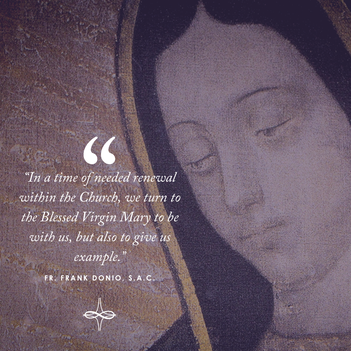
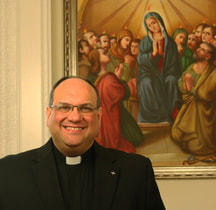
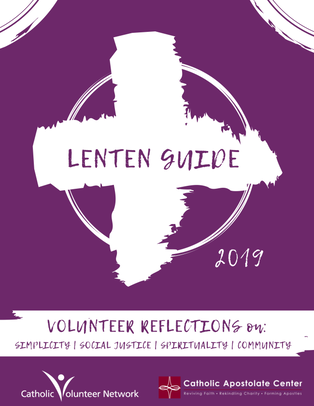


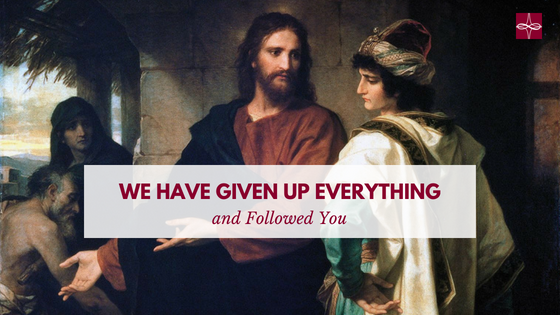

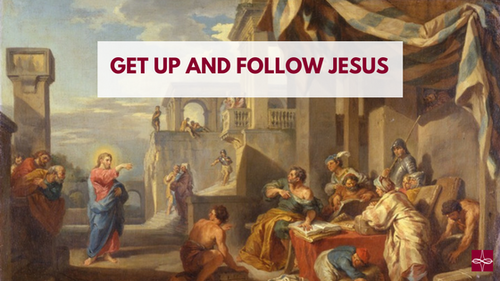
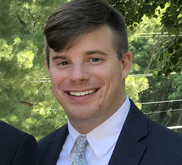
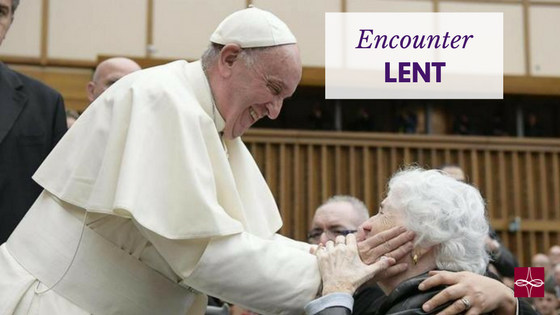

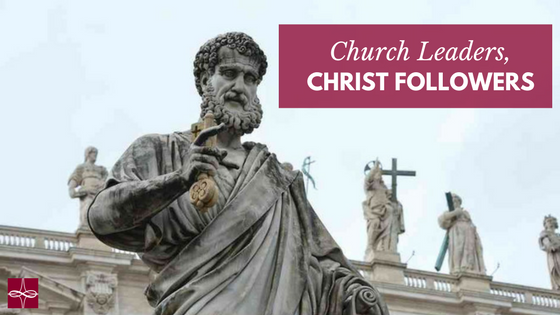
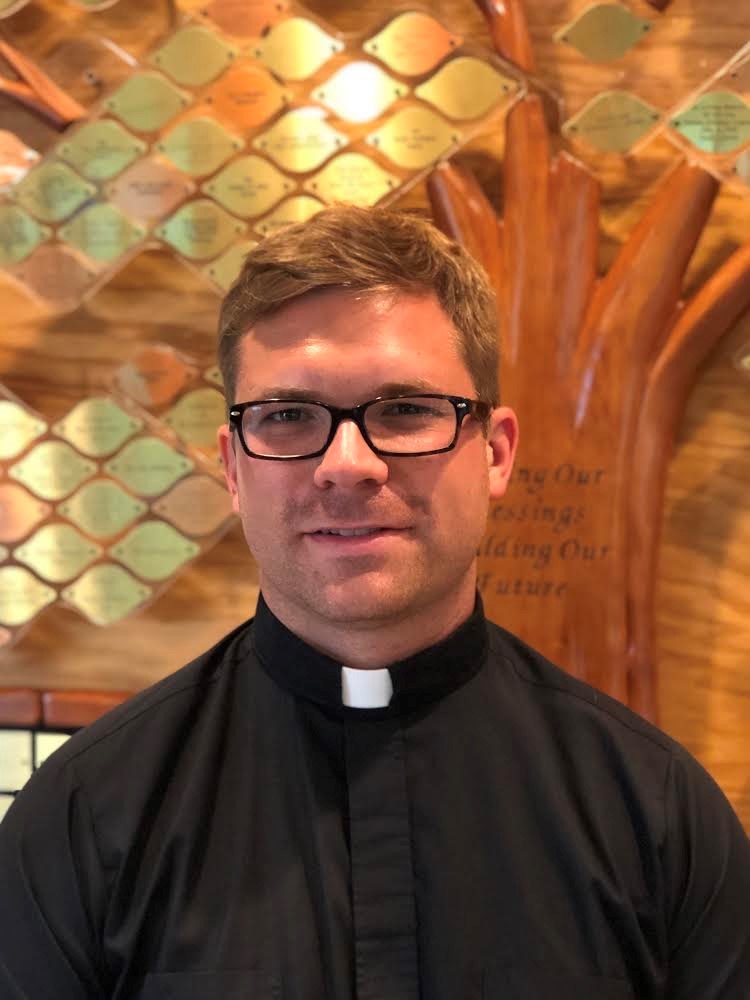



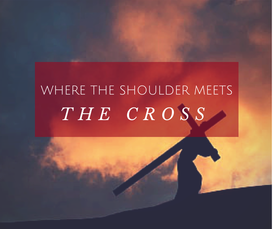

 RSS Feed
RSS Feed